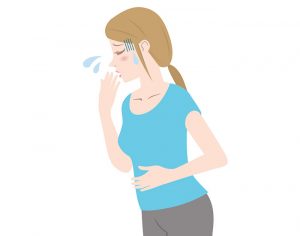Table of Contents
What is nausea?

Nausea is characterized by stomach discomfort and feeling of wanting to throw up. It often leads to vomiting. It is not a disease, but a symptom of many different health conditions, such as infection (stomach flu), food poisoning, blocked intestine from cancer spread, and certain cancer treatments (radiation therapy, or surgery).
How bad is my nausea?
Mild: You have a loss of appetite without changes in eating habits (for example, you still eat the same amount of food or number of meals every day). Most of the time, mild nausea can be safely managed at home by following the tips given below.
Moderate: Your food intake is decreased but you don’t have a significant weight loss, dehydration, or malnutrition. It can sometimes be safely managed at home but may require your doctor’s assistance. Learn how to manage moderate nausea in the section below.
Severe: You may have weight loss, uneasiness in your chest, abdominal pain, irritation in throat and vomiting. In some cases, severe nausea may be an emergency.
How to manage mild nausea
- Get enough fluids to avoid dehydration. Drink small amounts of clear liquids if you are having trouble keeping it down
- Eat smaller meals frequently
- Eat bland foods; stay away from spicy, fatty, or salty foods
- Avoid strong smells since they can sometimes trigger nausea and vomiting
- If vomiting and diarrhea last more than 24 hours, drink an oral re-hydrating solution (like Gatorade) to prevent and treat dehydration
How to manage moderate and severe nausea?
You will need guidance from a Doctor to manage moderate and severe symptoms. Contact your health care provider immediately if you have:
- A reason to think that your vomiting is from poisoning
- Vomited for longer than 24 hours
- Blood in the vomit
- Severe abdominal pain
- Severe headache and stiff neck
- Signs of dehydration, such as dry mouth, infrequent urination or dark urine
What causes nausea?
- Sea sickness and other motion sicknesses
- Early pregnancy
- Intense pain
- Exposure to chemical toxins
- Emotional stress (fear)
- Gallbladder disease
- Food poisoning
- Indigestion
- Various viruses
- Certain smells or odors
- Concussions
- Encephalitis
- Meningitis
- Intestinal blockage
- Appendicitis
- Migraine headaches
- Brain tumors
